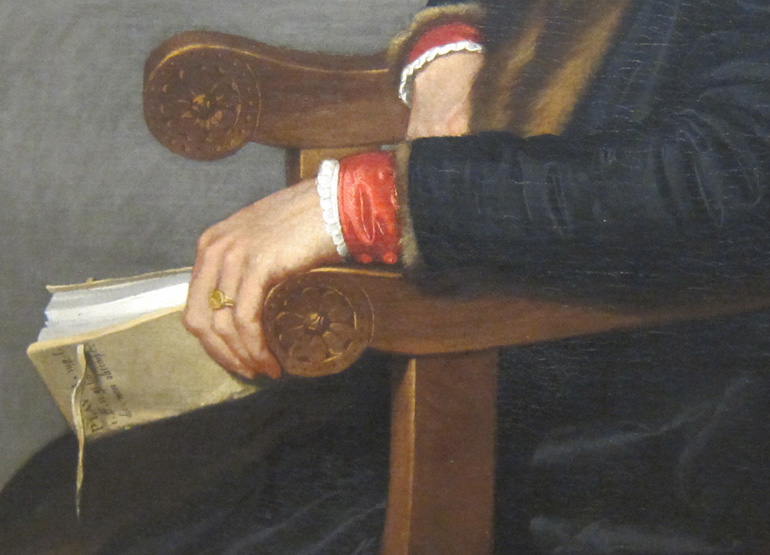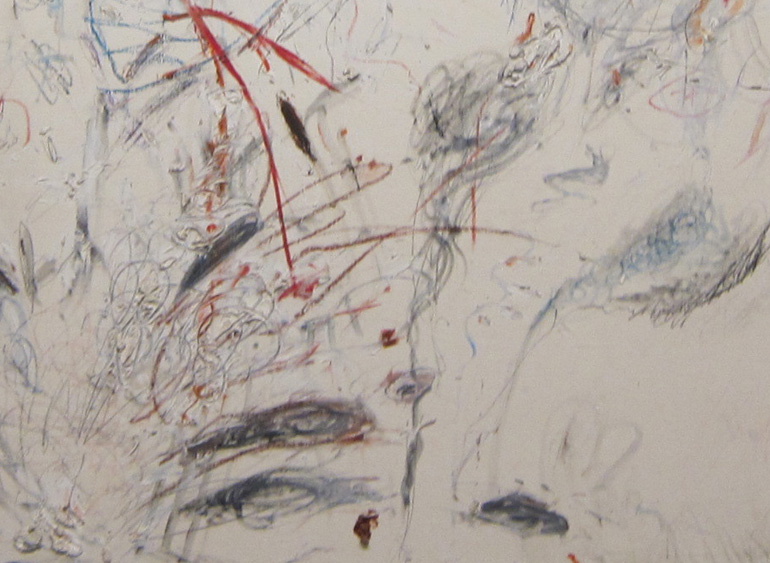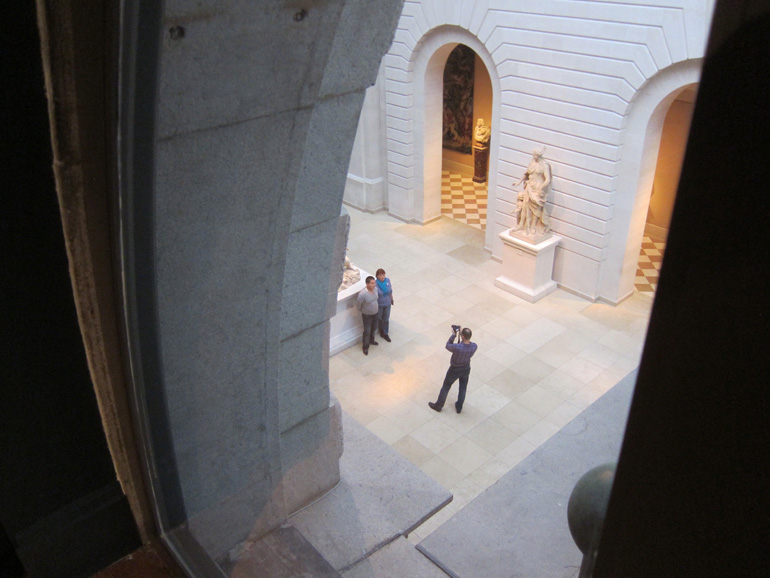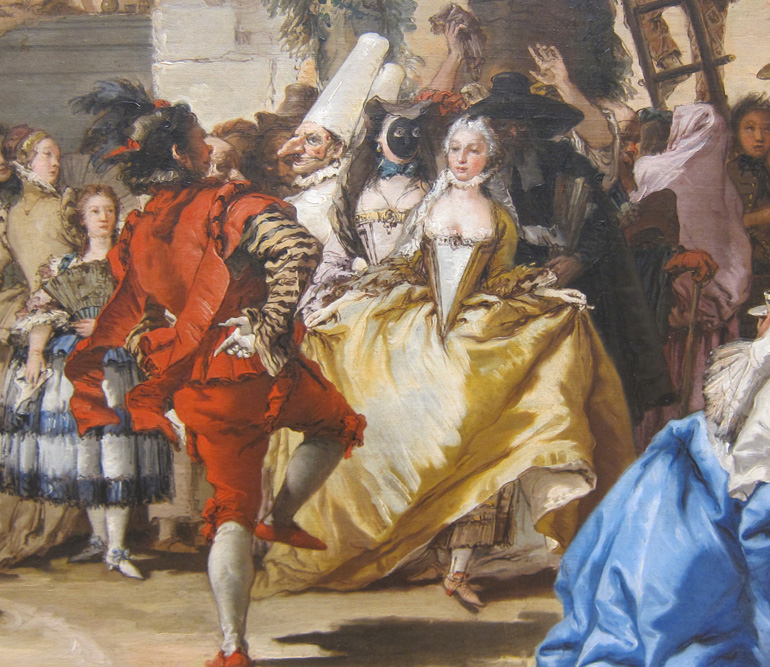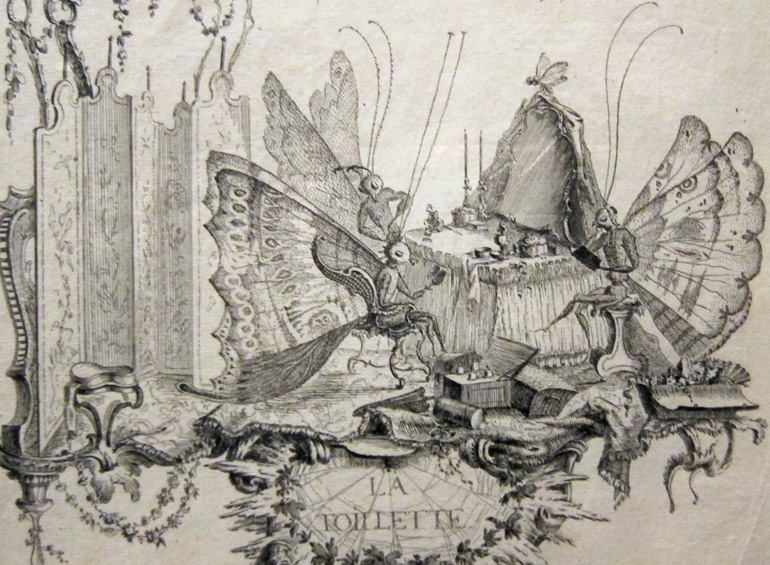
No sooner had I finished making the bed this morning than I wondered why: I suddenly very much wanted to lie down again. I had sat up to read the Times, and the cover story about Nicole Kidman in Vanity Fair, and Daniel Mendelsohn’s piece about Norman Mailer in the new NYRB — this last explained, more plainly than I could have imagined, why I never had any use for the public figure that Mailer was always attempting to be (although I do have a grudging respect for his books about Gary Gilmore and Marilyn Monroe). Now I was ready to get back into bed — but it was not possible, because I cannot make myself comfortable in the bed as it is made. I like to think that I make the bed in the way in which a bed ought to be made, but it is also true that, in its made state, the bed does not invite napping. In most American homes, I daresay, I could find a sofa or couch on which to stretch out, but there is none such here. The awful truth is that, the moment I try to take a nap, I wake up and become restless.
Every now and then, I do spend the day pretty much in bed. Perhaps four or five times in the year. But today was not going to be one of those days, because there’s an election on, and I have to go out to vote. In the Times this morning, Frank Bruni had a not-so-fast column on Hillary Clinton’s presidential prospects, which looked for a time to be ironclad, and as I read it I thought back to when I was sure that I would be voting for Christine Quinn today. But Quinn is not on the ballot. I’m still not sure how that happened, but I did learn that election cycles really are a lot like horse races. It’s best not to dwell too much on the likely winner until the last couple of minutes.
It will be interesting to see how badly Joe Lhota loses. That will be a measure of the city’s desire to say “goodbye” to Michael Bloomberg.
***
Reading The Silent Woman: Sylvia Plath and Ted Hughes, I wanted to suggest a better subtitle, but I couldn’t readily think of one. Janet Malcolm’s book, published originally in The New Yorker, in 1993, is not “about” Sylvia Plath or Ted Hughes. The two poets are, along with several other characters, points of departure, or nodes in a network, and they appear in the book as adamantly offstage figures. Malcolm never had any contact with Sylvia Plath, and her one epistolary exchange with Ted Hughes concerned a fine but important change that was made when the material was published in book form. The Silent Woman is much more about the poet Anne Stevenson, and about Olwyn Hughes, the poet’s sister and Plath’s literary executor (with the highest of ironies, because when Plath died intestate, her estranged husband was free to appoint whomever he pleased). It was Olwyn Hughes who persuaded Stevenson to amplify a short essay about Plath into a biography — a biography that would favor the Hughes side of the story. Bitter Fame, the result, elicited vats of opprobrium from the bacchantes who saw Plath as a martyr, which was all the more painful for Stevenson because, by the time Bitter Fame was published, she was no longer certain that she wanted to be on the Hughes side. She had experienced an epiphanic change of heart, while reading (at a rather late stage in the project) Plath’s unpublished journals and letters.
Back in London, Anne set to work on her newly conceived biography. She was on course now, and no longer needed a genie. She knew what she was doing, and would work alone. She commanded Olwyn back into the bottle. Naturally, Olwyn refused. For the next two years, Anne and Olwyn were locked in mortal, uneven combat over the book. Anne’s attempts to reclaim it — to be the author of her own book — were unsuccessful; she had lost control of the text when she made her devil’s pact with Olwyn. Olwyn maintained her iron grip. Anne was always forced to retreat, compromise, give up something she wanted to use, put in something she wanted to leave out. Olwyn would not allow Anne to reject her offerings of hostile testimony. Anne’s weak struggles on the pin, her attempts to stand up to Olwyn, only invited Olwyn’s contempt and wrath. by 1988, things had reached such a pass that the “collaborators” were not speaking. Then, as the book was about to go the way of all the other failed Plath biographies, [publisher] Peter Davison stepped in, and his offer to act as the final arbiter of what was to go into the book was accepted by both women. In 1989, a text was finally produced — one that Anne was not sure she wanted to publish under her name.
It was the storm that blew up over this book that caught Malcolm’s attention. Malcolm had known of and admired Anne Stevenson when they were both undergraduates — Stevenson a year ahead — at the University of Michigan, back in the 1950s. Malcolm was never a neutral observer, but a parti pris from the start: she was on Stevenson’s side, whatever that was. This rolling contentiousness among living women — women for the most part — and not the miseries of the dead poet, are what The Silent Woman is about, and it’s a ripping good yarn. It’s a pity that Pale Fire, ingenious as Nabokov’s novel is, does not attain this book’s narrative pitch. The Silent Woman would be just as good a read if Malcolm had invented everything in it, including Sylvia Plath, Ted Hughes, and their fame and reputations.
I grasped none of this when I flipped through the pages of The New Yorker that summer, twenty years ago, and sighed with exasperation. Ye gods, hadn’t there been enough about Sylvia Plath? You could say that Plath was a comet flying overhead at the start of my intellectual life. Ariel appeared when I progressed from high school to college. I never read it, but every time I saw the dust jacket (often) I thought of an angry poetess who killed herself. At one point in The Silent Woman, Janet Malcolm compares Plath to Medea, perhaps more aptly than she knew. I took Plath as the embodiment of what would happen if men did not start taking women seriously. I might not have been moved by her verse, and I might disapprove of her leaving her two little children orphans, but I never doubted for a moment that Sylvia Plath’s white-hot anger with men was fundamentally rational.
I had my own issues with men; I still do. Bored when not repelled by the more extroverted masculine pastimes — warring, trading, bluffing — I was made severely conscious that my own bookish pursuits, while they might constitute a masculine preserve in dreaming Oxford, were absolutely unmanly where I lived. (I have only to summon the memory walking down Pondfield Road to Womrath’s, the bookshop patronized only by women and very old men, to recapture the low regard in which Bronxville held the human imagination.) So I had less reason than most, when the time came to think about such things, to subscribe the idea that women were subordinate creatures, inferior in design and construction, however superficially alluring. Even on this last point, I was not like most men. I didn’t, and don’t, care for superficially alluring women. They make me very uncomfortable, largely because they provoke a strong desire to scold. I like women who are smart and thoughtful and good-hearted. I like men who are the same, but there aren’t nearly so many of them; men have trouble being smart and good-hearted (it comes from all that bluffing). At the beginning of my adult life, anyway, I was predisposed to consider women as intellectual equals. I was inclined to believe that Sylvia Plath’s unhappy example could be forestalled.
I didn’t realize it until this weekend, as I was reading The Silent Woman, but I demanded a price for my loyalty to women: I did not want women to question it. I did not want to be told that, no, I didn’t really get women’s issues. I didn’t mind having the issues explained to me, but I did not want to be held guilty of misunderstanding them in advance. If I disliked fighting with men, I didn’t care any better for fighting with women. I wanted women to stop talking (and otherwise behaving) as if there were no sympathetic men in the world. Because I well understood that there were women without any direct experience of sympathetic men, I made no positive complaint, but I did my best to ignore them. I even developed a nasty epithet to describe the strident, “critical” women whom I should ignore: humorless lesbian vegetarians. This phrase still has a certain guilty currency among my friends, doubtless because we have learned to apply it to humorless male beefeaters when appropriate. Humorlessness is the defining characteristic of this group to be shunned, and, as late as 1993, I thought I detected a note of it in Janet Malcolm’s writing. Even for me, it was possible to be “too serious.”
But it was I who lacked the better sense of humor; I see that now. I know it when Malcolm makes me laugh. It is a darkly gleeful laughter, of the sort that Malvolio prompts in Twelfth Night. The passage that I have quoted above, about Anne Stevenson’s struggle to free herself from Olwyn Hughes’s tyranny, is not obviously hilarious, but it is threaded with laugh lines. Throughout the book, Malcolm compares Hughes to a string of grandiose divas, “Sphinxes and Turandots.” So when, here, she reappears as the genie who won’t slip back into the bottle, the ongoing suggestion of superpowers brings a smile. And that bit about “all the other failed Plath biographies” — that has a sardonic resonance as well. Far from being a “feminist screed,” The Silent Woman is a devilishly sparkling meditation (if I may risk oxymoron) on the civil status of secrets and privacy. I loved every page of it.
Now I can read Ariel.








